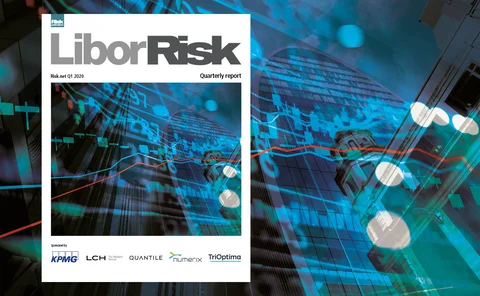Sponsored content
For further information on creating and publishing sponsored content, please click here.
Structured products – Transforming risk into opportunities
The structured product market is one of the most dynamic and complex of all, offering a multitude of benefits to investors. But increased regulation, intense competition and heightened volatility have become the new normal in financial markets, creating…
Rethinking compliance – New approaches to conduct risk and surveillance in 2020
Risk.net's annual Top 10 Operational Risks Survey found that conduct risk ranked among the most pressing issues keeping operational risk professionals awake at night. With an emphasis on reducing costs, firms are required to employ data within their…
Global macro views combine with quantitative models to produce consistent returns
The team behind River and Mercantile Group’s global macro strategy team operates under two key principles: that macro is the most important aspect of any investment decision and that decision-making should incorporate both systematic and discretionary…
Calculating fair valuations for securities – The underlying complexities of trading fixed income
While some things have changed significantly over the past two decades across the capital markets, others have ostensibly remained the same. Take, for example, the challenge facing capital markets firms when calculating fair valuations for the securities…
Managing a derivatives portfolio through turbulent markets
Steering a portfolio of non-linear derivatives, such as options and more exotic products, is challenging at the best of times. Market risks change as markets move and time passes, risks offset in complex ways and proxy hedging is common. In this feature,…
Counterparty credit risk – Why data is only valuable in context
Paul Whitmore, global head of counterparty risk solutions at Fitch Solutions, explains how qualitative data can add colour and insight to quantitative metrics for assessing the creditworthiness of counterparty banks
IFRS 17 – Preparing for the transition
This webinar explores the key elements of the International Financial Reporting Standards, the key challenges of implementing the systems and related data issues, and how the regulatory landscape may look post-implementation
Using new AI tools to improve anti-money laundering and drive efficiency
This webinar explores how the marriage of AI and expert models lays the groundwork for a strong AML programme foundation that eliminates backlogs and creates efficiencies
Implementing Basel IV in Asia-Pacific – Mapping out the next steps
This webinar explores the current pain points and provides insights on Basel IV implementation in Apac, addressing the most common challenges and what it takes to transform to a Basel IV-compliant financial institution
Utilising technology to integrate capital management and stress-testing
This webinar explores how stress-testing has evolved over the past few years and how financial institutions can benefit from leveraging models in capital planning
Climate risk – Special report 2020
As governments worldwide focus on the coronavirus (Covid‑19) pandemic amid plummeting demand for fossil fuels, it may seem climate change has dropped down the global agenda. Firms that don’t assess the climate risk in their portfolios, or hedge or divest…
Uncharted waters
How pension plans can better equip themselves for a period of economic upheaval. By Matthew Seymour, RiskFirst, a Moody’s Analytics Company
Uncleared margin – The changing needs of buy-side firms
Raf Pritchard, head of triResolve, discusses the initial margin calculation and collateralisation challenges for firms coming into scope under phases five and six of the uncleared margin rules
Building a holistic GRC framework in fragmented Asia-Pacific markets
This webinar explores best practices in meeting regulatory and data governance requirements in fragmented markets
Libor Risk – Quarterly report Q1 2020
Regulators may have to accept Libor transition will be slower than they hoped. But the final framework may yet be more robust as a result. Knowing how rates perform in times of stress will be crucial to the success of benchmarks intended for real economy…
Machine learning in fraud analytics – Getting it right
Over the past couple of years, financial institutions have made significant achievements in the fight against fraud by embracing machine learning analytics and advanced artificial intelligence
Pre-cessation Ibor picture gets clearer
As the derivatives market has accepted the impending transition away from interbank offered rates, attention has turned to how best to manage it. Philip Whitehurst, head of service development, rates at LCH, explores how the clearing house is working…
Global investing under water? – Climate change could leave equities exposed
As impending global changes brought about by climate change loom, one issue in particular threatens to cause massive losses to institutional investors – rising sea levels. David Lunsford and Boris Prahl, of MSCI, explore where, despite the efforts of…
A sea change – Driving awareness to confront climate risk
Amid a global push towards green policies, the reality of overhauling how industries worth trillions of dollars operate is causing concern. A forum of market participants and sponsors of this report discuss the levels of awareness of climate risk and its…
Three strategic priorities to meet the new FFIEC regulations
This webinar analyses the key challenges and strategic priorities for firms to meet the evolving requirements for operational resilience
Credit risk – Building on a foundation of quality data
Credit risk analysts at emerging market banks not only need high-quality data, but also the necessary tools to manage it. Improving consistency and reducing the risk of errors in credit risk data create more time to concentrate on the core activity of…
Operational uncertainty – An unavoidable challenge
The transition from Libor to a new risk-free rate has revealed a number of challenges for all financial markets participants – the nature and scope of what lies ahead is vast, impacting businesses, operations and support functions. KPMG‘s global Libor…
Managing the cost of transition and the risk of delay
A forum of industry leaders, which includes sponsors of this report, discusses key industry concerns around the transition away from Libor, including the risks investors will face once the rate is discontinued and how to manage them, whether forward…
Transforming trading, risk and operations
Capital markets technology firm, Murex, enjoyed outstanding success in the Risk Awards 2020. Amid fierce competition, the firm was named technology vendor of the year, and picked up a further five gongs in the Risk Markets Technology Awards























